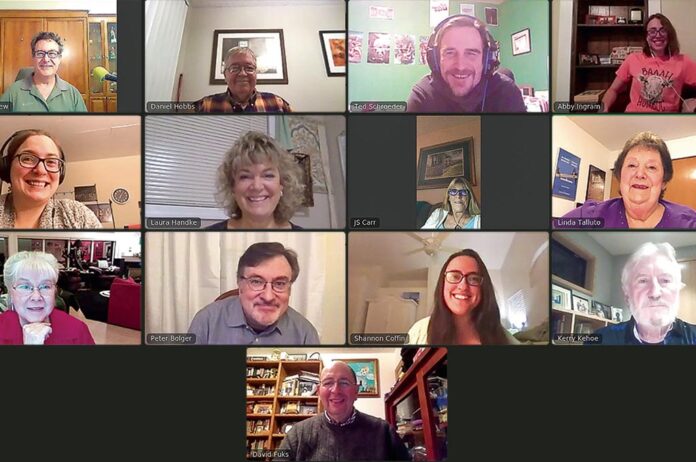
When the COVID-19 pandemic hit Oregon a year ago, it struck the leisure and hospitality sector harder than the rest.
That included live music venues, restaurants and bars, and, in Tigard, the Mask and Mirror Community Theatre. Just days after the opening of the theater’s March 2020 production “Deathtrap,” Oregon Governor Kate Brown’s declaration of a state of emergency resulted in the closure of the theater. Since that time, little has changed. The sets for Deathtrap even remain on the stage at the Calvin Presbyterian Church in Tigard.
“We don’t have a schedule yet because we don’t know when we’re going to open,” said John Knowles, President of the Mask and Mirror Executive Board. “We were halfway through performing it when COVID hit – the set is already on the stage.”
But theater members do know they have entered 2021 with a renewed sense of hope. Not only is there enough grant funding to ensure operations into the new year, the theater and its members also found a creative new way to put on performances during the winter holiday season that bypassed pandemic restrictions.
They did that by borrowing a page out of the pre-television era and the heyday of American radio plays.
“We came up with the idea of possibly doing audio shows,” said Rick Hoover, a Mask and Mirror board member, actor and director.
The first play, H.G. Wells’ 1938 radio classic ‘War of the Worlds’ was done for Halloween, just like the original.
“We suggested it to do that as a test to see if anyone would actually listen,” Hoover said.
Not only did people listen in greater numbers than live performances, they even attracted international interest from as far away as New Zealand.
“It worked out well, we made some money on it and we had people listening from all over the country and from outside the country, even,” Hoover said. “It was a very successful run of three nights.”
While there were no costumes, sets or stages to deal with for the production crew, the learning curve involved with an audio production was still steep.
Casting also proved challenging, with only the actors’ voices to go on. At the same time, being an online production allowed the theater to reach out beyond the Portland area to find the people they needed.
So many people showed interest that Hoover ended up casting three separate groups, moving some people into different roles from show to show.
Then they took all the lessons learned from “War of the Worlds” and applied it to Charles Dickens’ ‘A Christmas Carol.’ This time, Dan Hobbs was the director. Hobbs crafted a significant amount of new script material and used women in roles that were originally written for male characters.
“I basically cast it into a form for readers theater with narration and speaking cards,” Hobbs said. “A lot is Dickens’ material and a lot is mine that I made up.”
Recording the actors’ parts was easier this time around.
“One of the things that was different, and I always put this under lessons learned,” said Ted Schroeder, a member of the theater’s Board of Trustees. “ Is he (Hobbs) did a sound level check before rehearsals.”
Afterward, Hobbs followed up with each cast member.
“He’d send an email with notes, and that was very helpful,” said Pat Romans, who voiced the role of Tiny Tim. “I think each of us improved our performance over the rehearsal period because we had feedback.”
Actor Kerry Kehoe portrayed Ebenezer Scrooge and found voice acting just as difficult as being on a stage, especially when emotions are required.
“Dan pointed out to me that I needed to find different ways of showing that stress,” said Kehoe. “In the live performance you can use physicality to do that.”
Romans has been involved with Mask and Mirror since its 2011 inception. She said radio plays eliminate much of the production work involved in stage performances. But more volunteers and participants are always welcome.
“We seem to get plenty of actors,” she said. “But we’re always looking for people who will work on production.”
That’s the lifeblood of any local theater, Knowles added.
“We love it when the community gets involved, not only as the audience, but as volunteers and helping out,” he said. “The sense you get from participating is an overwhelming great feeling, you make wonderful friends.”





















